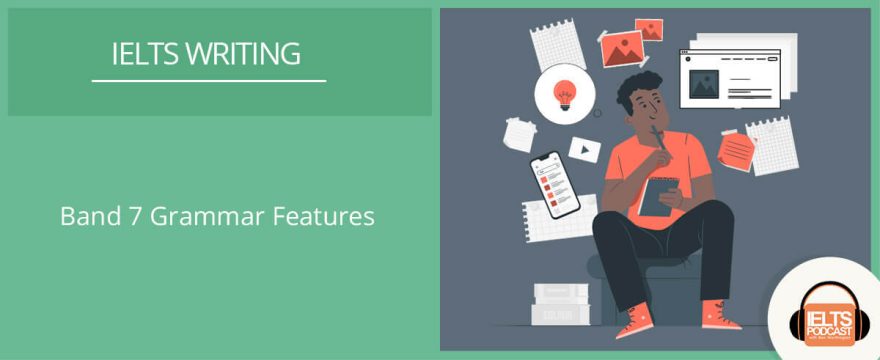In this tutorial, we discuss Band 7 Grammar features in IELTS Writing.
Table of Contents
- Introduction
- The Importance of Band Descriptors
- Aiming for Band 7 and Above
- Understanding Complex Structures
- Advanced Grammatical Structures
- Punctuation: The Role of Commas
- Conclusion
- Introduction
Hello there! I am a student and welcome to this podcast. You no longer have to worry, feel threatened, or panic about IELTS because we are here to guide you through this test jungle. Enjoy these IELTS tutorials, and if you need more help or want to access the finest online course, you can visit us at IELTS podcast.com.
- The Importance of Band Descriptors
Hello everyone, welcome to another tutorial here at ieltspodcast.com. My name is Ellen. Today, I want to emphasize the importance of understanding the band descriptors. Many people begin their IELTS preparation without ever seeing these descriptors. They are crucial not just for grammar but for all four criteria for Task 2, Task 1, and speaking.
- Aiming for Band 7 and Above
If you need a Band 7, you probably require it for immigration or professional purposes in English-speaking countries. However, it’s essential to aim higher than just Band 7. By setting a goal for Band 8, you ensure that even if you miss a few points, you’ll still comfortably achieve the score you need.
- Understanding Complex Structures
Complex structures are sentences with more than one subject and verb. Common examples include sentences with connectors like “and,” “but,” “although,” and relative clauses. For instance, “While there are advantages, the disadvantages are greater.”
- Advanced Grammatical Structures
– Participle Clauses: These start with active participles (ing) or past participles (ed). Example: “Having worked with children, I have learned…”
– Inversion: This involves starting a sentence with a negative adverb or using “only if” or “only when.” Example: “Rarely do we see parents…” or “Only when parents teach, will children learn…”
– Fronting: These sentences start with an “it” clause. Example: “It is the responsibility of…”
- Punctuation: The Role of Commas
Punctuation, especially the use of commas, plays a vital role in writing. Overusing or underusing commas can disrupt the flow of your writing. It’s essential to strike a balance and use them where a natural pause is required.
- Conclusion
In conclusion, mastering complex structures and understanding punctuation are crucial for achieving a high band score in IELTS. If you’re looking for more guidance, sign up for updates and courses at IELTS podcast.com. Best of luck to all, and thank you for listening!
Join many other students who have achieved IELTS success with our online IELTS course or get instant feedback with our online essay checker.
You can download or listen to the full tutorial here:
| Direct Download Here | Stitcher | Apple Podcasts | Spotify
Podcast: Play in new window | Download
Subscribe: RSS

